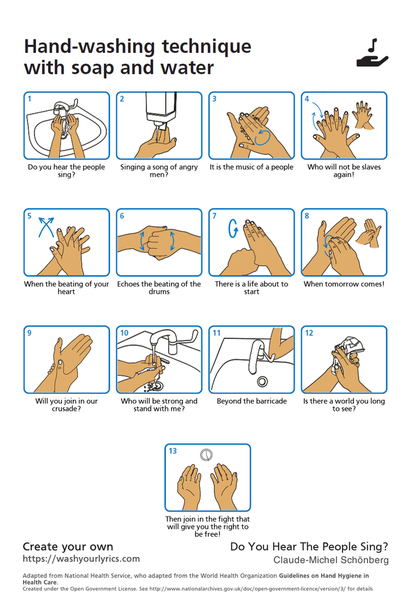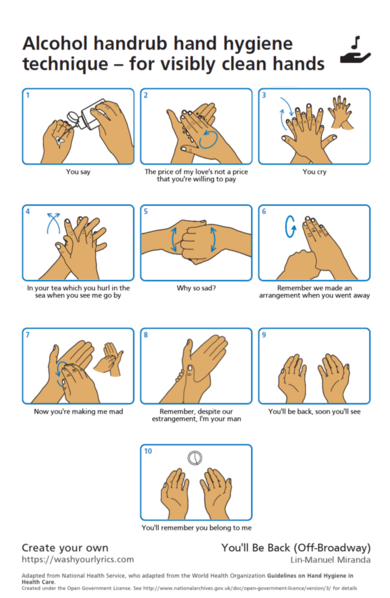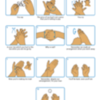Keeping your hands clean is one of the easiest ways to reduce the spread of the new coronavirus that causes COVID-19. It can also help help protect you from flu, colds and other respiratory infections. It also helps prevent foodborne illnesses (such as salmonella) while cooking.
One study shows people touch their faces on an average of 23 times an hour.1 Your hands come in contact with many germs, and when you touch your face, you increase your chances of getting sick. Keeping them clean can help you and others stay healthy.
Lather Up the Right Way
Even though hand-washing seems like a basic task, there actually is a correct way to do it. Here are tips for washing your hands properly:
- Wet your hands with clean, running water.
- Add soap and rub your hands together to lather the soap. Take care to rub your palms, backs of your hands, between your fingers and under your fingernails.
- Wash your hands for at least 20 seconds. For fun, sing a song while you wash. You can use the alphabet song, sing “Happy Birthday” twice or pick your favorite song.*
- Rinse your hands well with running water.
- Dry your hands using a clean towel. Or air dry them if no towels are available. Don’t rub them on your clothes or you could get them dirty.
- Turn off the faucet with your elbow or with a paper towel.
*You can create a poster or infographic using your favorite song on the WashYourLyrics.com website. AAFA’s Chief Mission Officer Melanie Carver uses songs from musicals, like “Do You Hear the People Sing?” from “Les Misérables.”
A black light experiment, as seen in the video below, shows you just how effective proper hand-washing can be.
When you wash your hands is important too. Remember to wash your hands:
- After you use the bathroom
- Before eating
- When preparing food
- After caring for someone who is sick
- After changing a child’s diaper
- After cleaning or handling trash
- After blowing your nose, sneezing or coughing
- After touching a frequently touched surface, including cell phones and computers, especially in public areas
Choose the Right Hand Sanitizer
If you can’t wash your hands, hand sanitizer is the next best tool – if it’s the right kind. Hand sanitizer should have the right combination of alcohol and strength. Look for a hand sanitizer that contains:
- At least 60% ethyl alcohol (ethanol), or
- At least 70% isopropyl alcohol (isopropanol)
When applying hand sanitizer, rub it on all surfaces of your hands for at least 20 seconds. Let your hands air dry. You can use a song to help ensure you rub your hands for 20 seconds. AAFA’s President and Chief Executive Officer Kenneth Mendez recommends “You’ll Be Back” from the musical, “Hamilton.”
Hand Sanitizer Warnings and Recalls
Avoid hand sanitizers that contain 1-propanol and methanol (a toxic type of wood alcohol). Methanol and 1-propanol should not be applied to skin. Several toxic hand sanitizers are now on the market to meet the demand caused by the new coronavirus. The Food and Drug Administration (FDA) has issued a warning about several brands of harmful hand sanitizers. Some products have been found to contain methanol and 1-propanol but are labeled ethanol. Some products are under recall from the manufacturing companies. The FDA website has a warning list of hand sanitizers to avoid.
Methanol can cause symptoms that can include nausea, vomiting, headache, blurred vision, seizures. 1-propanol can cause confusion, decreased consciousness and slowed breathing or pulse. Then report the reaction to the FDA.
Other Safety Tips for Hand Sanitizer Use
Also, remember these other safety tips:
- Supervise children when they use hand sanitizer.
- Any hand sanitizer can be harmful if ingested.
- Don't store the hand sanitizer in high heat (like in your car).
- Don’t use surface disinfectant wipes to clean your hands, or any part of your body. They can cause irritation on your skin and eyes. Wash your hands after using them to clean surfaces.
Protect Your Skin
All this hand-washing and sanitizing can take its toll on your hands, especially if you have atopic dermatitis (eczema). Avoid harsh antiseptic soaps. After washing your hands, pat them dry. Try not to rub the skin. Then apply a moisturizer to your hands. Wear gloves when cleaning to protect your hands from chemicals.
Proper hand-washing is effective in preventing the spread of the new coronavirus and other illnesses. But it doesn’t work alone. Combine it with physical (social) distancing and wearing a mask to reduce the spread of the new coronavirus.
JOIN NOW
References
1. Kwok, Y. L., Gralton, J., & Mclaws, M. (2015). Face touching: A frequent habit that has implications for hand hygiene. American Journal of Infection Control, 43(2), 112-114. doi:10.1016/j.ajic.2014.10.015





Comments (0)